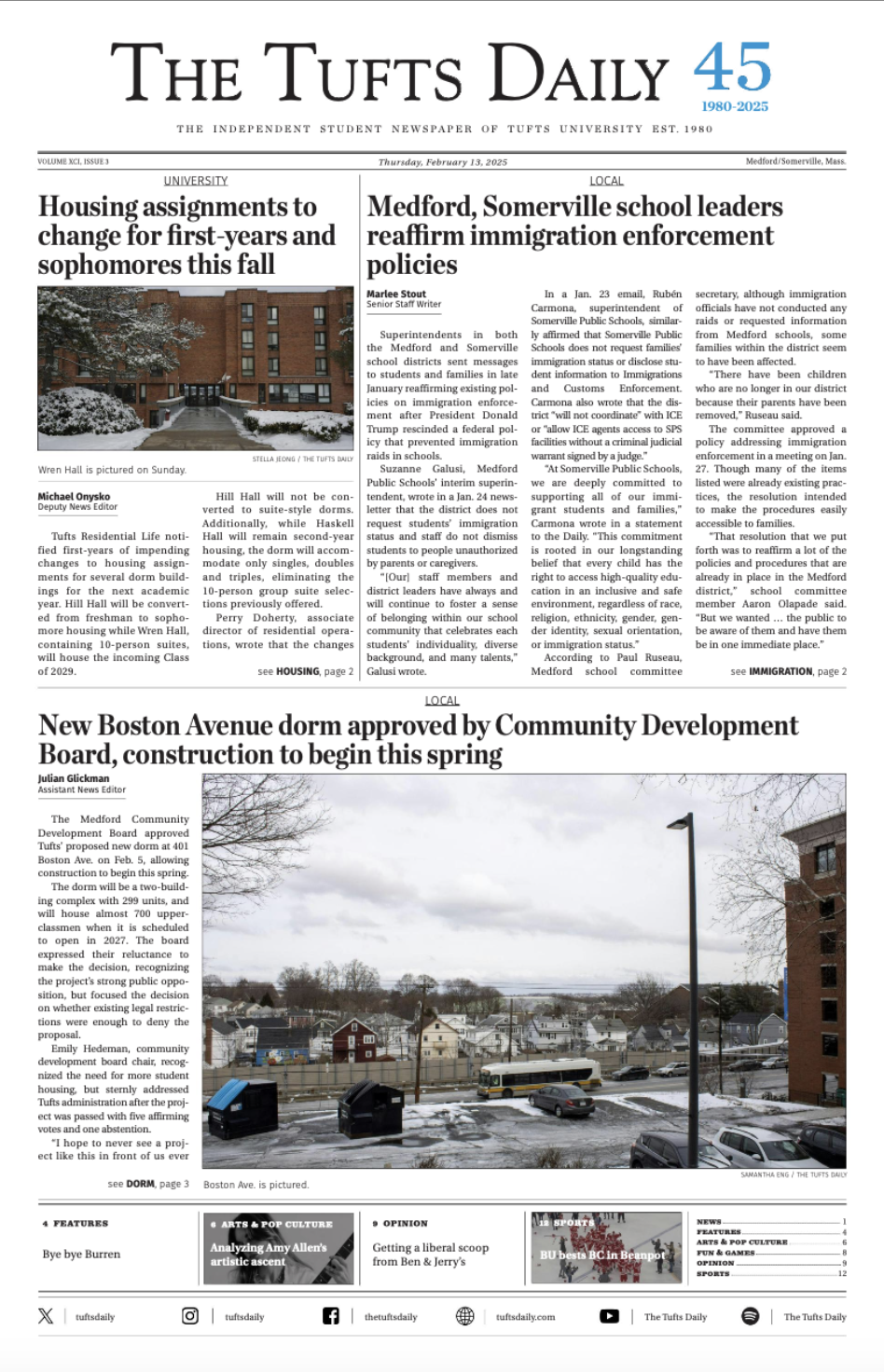Why don't most white people care about racism? I really do not understand. Most white people do not see racism as something that shapes their lives, despite the fact that it most definitely does. Tuesday night, I went to a discussion with the Pan-African Alliance at Capen House to discuss why white people feel they cannot walk into the Africana Center. While we never reached definitive conclusion, I think it boils down to racism.
There are several types of racism that prevent white people from going to the Africana Center, the most blatant of which is that they don't like black people. They believe in the myth of white supremacy and would never want to associate with black people. Most of these people will deny this kind of racism exists within them, but it's there. It's what they have been taught by their families, the media, and our schools. These people do exist, they do attend Tufts, and they are pathetic.
Then, there is a slightly subtler form of racism that prevents people from going to the Africana Center. This form of racism manifests itself in the notion that white people have no need to concern themselves with black issues or race issues in general. While they may know that they are white, they do not think about what this means. To be white is not to be race-neutral; it is to be privileged. I cannot list the number of privileges that I and other white people get because of our skin color, but the one I am most concerned with right now is the privilege not to think about race or racism.
While this is a privilege, it is also a terrible detriment. Not to know about race or racism is not to understand our country. Not to understand where our nation comes from nor where our nation is now, nor even where Tufts comes from and where Tufts stands now. White people do not go to the Africana Center, or any of the other culture centers, because they do not view issues relevant to people of color as relevant to their own lives. This is an absurdly ignorant and self-centered belief. Even if we forgot about the innumerable ways in which race impacts the lives of white people, just for a second, there would still be the infinite ways in which the lives of people of color are greatly affected by racism.
This varies from symbolic racism, in which the media consistently portrays people of color negatively and inaccurately, to individual acts of racism like bias incidents and hate crimes, to institutionalized racism that keeps Asian-American studies out of the Tufts curriculum and causes lower rates of faculty retention of professors of color. If these forms of racism only affected people of color and we ignored the effects they have on white people, this in itself is enough for white people to concern themselves with racism. White people live alongside people of color in the dorms, classrooms, and in the greater communities. Racism profoundly affects these people and to ignore that is to ignore them.
Now, let that moment end when we forgot that racism affected white people, because racism does affect white people. The system of racism that has developed in our country is one that systematically privileges white people consistently. I've heard many white students pride themselves on the fact they got into Tufts without the "unfair advantage" granted by affirmative action policies to students of color. That is utter nonsense. I got into Tufts because I am white. That is not the only reason I got into Tufts, but it is a very significant one that I cannot, and should not, forget.
My white privilege has helped me as long as I can remember. When I was two years old, my family moved out of Philadelphia to a suburb that was almost entirely white. The fact that my family was white made it easier for them to move into the suburbs so that I could go to the better school district. Once I was in school, I was never considered a "credit to my race" when I did well in class and I was recommended for the honors classes in high school without question.
And yet when I looked around those honors classes, I wondered where my smart black friends from middle school went. In my high school with over 1,200 students, why were there no black students in my honors classes? Why did I only read one book by an African-American author in all my years of high school? That was not my nation's literature. Why did my history textbook only dedicate special colored boxes to talk about African-American history while the rest of the book only talked about white people? That was not my nation's history.
I have been poorly educated. I have not learned about my country; instead I have learned about the white people who have held positions of power for most of its history. In doing so, I was taught not to think about race. After all, what did racism have to do with colonialism? Or Japanese internment? I reject the idea that racism does not affect me because I am white. Racism has shaped my life in more ways than I will ever know. And that is why I, and other white people, do need to step into the Africana Center and enter into conversations about race.
Go to the other culture houses. Remember that race is not just black and white. Read poetry by Gloria Anzald??a or Audre Lorde. Find out who Vincent Chin was and learn about Leonard Peltier. Walk into the Latino Center and listen. You may be afraid that the people there will reject you, but what you really fear is finding out that you might reject them.
Alex Weissman is a senior majoring in American Studies.





